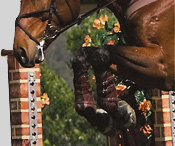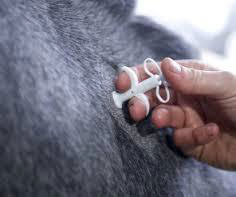



"Building healthy partners"
MICROCHIPS - A GOOD IDEA


Microchips a good idea for your horse.
This fall we are offering microchip placement with pre-paid permanent registration as part of our Fall clinics. I have researched the microchip situation, considered the pros and cons, and have come to the conclusion that this is a GOOD idea for our horses. Permanent identification can be useful in routine transactions such as breed registration, health certificates, transfer of ownership, brand inspection and Coggins testing for Equine Infectious Anemia Virus.More importantly, under certain circumstances a microchip could save your horse’s life. What is the likelihood that you will lose track of your horse? Slim. How will you feel if it happens? Devastated. Horse theft is no longer a common occurrence, but it still happens with alarming frequency, according to Stolen Horse International, a non-profit organization which reports missing horses across the United States.

Natural disaster is a more likely scenario which could separate y
ou from your horse. In our area, both fire and flash flood are very real entities. I took this picture standing next to the horse trailer, preparing to evacuate horses from a client’s property. Luckily we were on site when the lightning hit 30 feet from the barn. Following Hurricane Katrina disaster management professionals reported that microchipping played a significant role in their ability to reconnect horses with their owners.
Is there a downside to microchipping your horse? Not really. In horses, the microchip is implanted by simple injection into the nuchal ligament, about 1 inch below the mane and half way down the neck. Sedation is not necessary, and horses typically react as they would to any routine intramuscular injection. Chips placed in this location do not migrate, and do not cause significant tissue reaction. In one study conducted at the Graf Lehunderff Institute for Equine Science, a thin fibrous capsule with minimal inflammation was the only reaction noted in 35 horses implanted with long term microchips.
It is important to understand that all microchips and microchip readers are not created equal. Permanent identification is only useful if it is 1) truly permanent, 2) detectable, and 3) traceable. Because centralized regulation of microchipping for pets has not been implemented yet in the US, a variety of microchips and microchip scanners are commercially available. They have different radio frequencies, different number sequencing codes, and different registration options. The International Standards Organization (ISO) is working to create an animal identification system that is consistent worldwide. We have chosen to use the Pro-ID Equine Chip. These are the most up to date, 134.2 KHz ISO compatible chips, as recommended by the American Veterinary Medical Association and ISO. They can be read by any Universal Microchip Reader, and conform to international and FEI standards. The Pro-ID Equine Chip we implant in your horse is pre-registered with the Equine Protection Registry, a database that has been maintained in the US for over 20 years. If you lose contact with your horse, you will immediately contact the Equine Protection Registry. A number of Equine Protection Network affiliates such as brand inspectors, law enforcement agencies, Stolen Horse International, and national disaster preparedness groups will be alerted immediately.
A microchip could make a big difference to your horse should the unexpected become reality.
Learn more: www.microchipidequine.com
PO BOX 60730
RENO NV 89506
EMERGENCY (775) 742-2823 OFFICE (775) 969-3495
FAX (775) 969-3923




